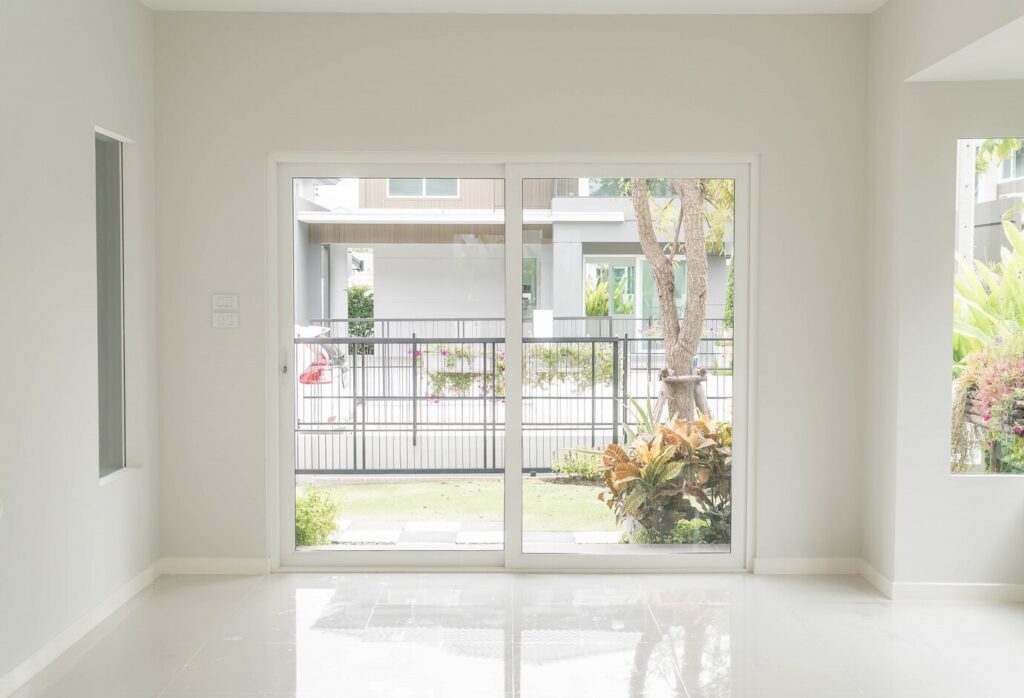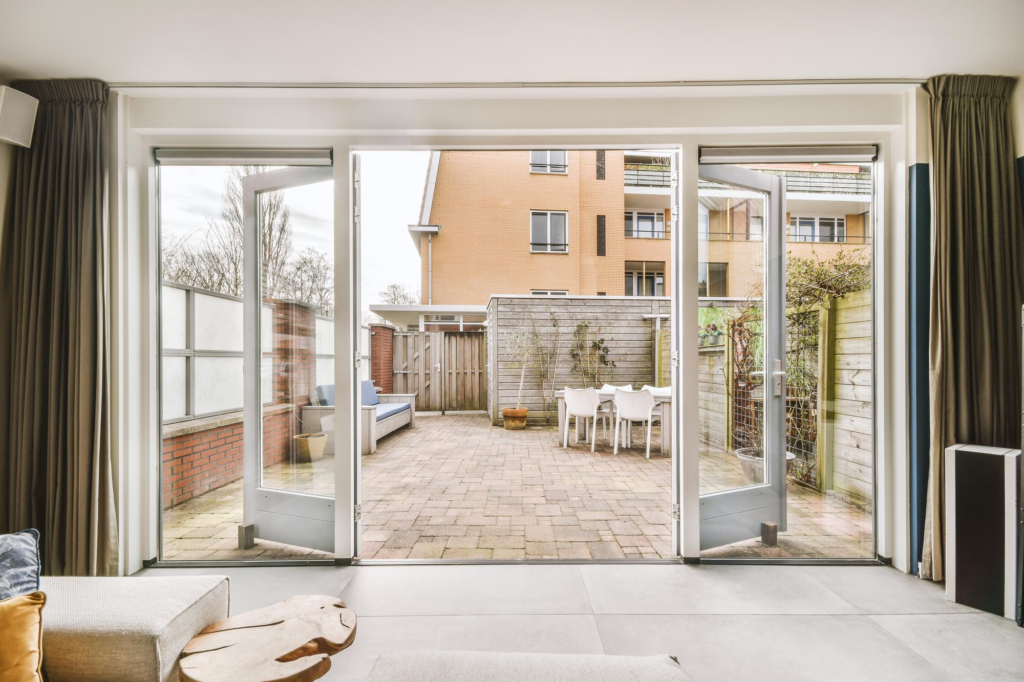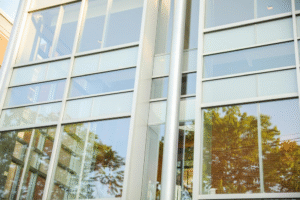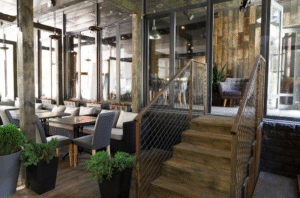
When planning your perfect patio space, choosing between sliding doors vs hinged doors is more crucial than you think.
This decision can affect everything from the overall aesthetic to the functionality and your outdoor area’s usability.
Each door type offers distinct benefits and potential downsides, so carefully consider your space, lifestyle, and preferences.
This article explores the pros and cons of sliding doors vs hinged doors, focusing on their practicality, design appeal, and how they can transform your patio into an extension of your home.
Sliding Doors vs Hinged Doors: What Are They?
You must understand the characteristics and differences between sliding doors vs hinged doors before diving into the pros and cons of each one. These details are essential in determining their functionality, aesthetics, and suitability for your space.
Sliding Doors

Sliding doors consist of glass panels that move horizontally along a track. This design allows them to open without taking up additional space, making them a popular choice for modern patios or areas with limited room.
The operation of sliding doors involves one fixed panel while the other glides along the track to open or close. This system provides seamless access to outdoor areas without disrupting the furniture arrangement or room layout.
Common Applications:
- Compact patios where space is limited.
- Homes with contemporary designs that emphasize clean lines and minimalism.
- Areas prioritizing natural light, such as living rooms or kitchens with patio access.
Hinged Doors

As their name suggests, hinged doors are mounted on hinges and swing open either inward or outward. They are a classic choice, known for their durability and timeless style.
These doors operate by pivoting on side-mounted hinges, enabling a wide opening. Some variations, like French doors, feature two panels that open from the center, offering a sophisticated and functional aesthetic.
Common Applications:
- Spacious patios where there’s ample room for the door’s swing.
- Homes with traditional or rustic styles.
- Spaces requiring maximum ventilation, as hinged doors can be fully opened.
With these definitions, you can already see which option might be better for your space, right?
Now, let’s dive deeper into the pros and cons of sliding doors vs hinged doors!
Sliding Doors vs Hinged Doors: Advantages of Sliding Doors
When comparing sliding doors vs hinged doors, sliding doors often stand out for their unique features that combine modern aesthetics with practicality.
They are an excellent choice for homeowners and designers determined to optimize space and create a natural connection between indoor and outdoor areas.
Here are the key advantages of sliding doors:
Space-Saving Design
One of the most significant benefits of sliding doors is their efficient use of space. They don’t require additional room for operation, as they slide horizontally along tracks instead of swinging in or out.
This makes them ideal for:
- Small patios or compact outdoor spaces.
- Indoor areas where furniture and decor are positioned close to the entrance.
Sleek and Modern Aesthetic
Sliding doors offer a minimalist design that perfectly complements modern architectural styles. Their clean lines and large glass panels create an elegant look, enhancing the sense of openness and brightness in any space.
- Suitable for contemporary projects that prioritize simplicity and functionality.
- Available for customization in various materials, such as aluminum, PVC, and wood.
Tip: Choose sliding doors with slim frames and matte black finishes for an ultra-modern appearance.
Seamless Indoor-Outdoor Connection
As mentioned, sliding doors are perfect for transitioning between indoor and outdoor spaces. Their large glass panels provide unobstructed views of patios or gardens while ensuring easy access to different areas.
- Increased natural light, reducing the need for artificial lighting.
- Ideal for spaces like living rooms connected to decks or balconies.
Tip: Pair them with double-glazed or Low-E coated glass to improve thermal efficiency, keeping your home comfortable all year.
Adaptability for Large Openings
Sliding doors are highly versatile and can be designed to cover expansive openings, creating a dramatic visual impact. They are especially useful in homes that aim to:
- Transform an entire wall into a functional entryway.
- Provide easy access to outdoor entertainment areas.
When considering sliding doors vs hinged doors, these advantages highlight why sliding doors are the number one choice for many homeowners.
Sliding Doors vs Hinged Doors: Advantages of Hinged Doors
On the other hand, when comparing sliding doors vs hinged doors, hinged doors provide specific benefits that make them an ideal choice in various situations.
With their traditional functionality and styles, these doors are a standout option for homes where space is not a concern, and features like sealing and security are top priorities.
Let’s explore the advantages of hinged doors and understand how they excel in the sliding doors vs hinged doors comparison.
Superior Acoustic and Thermal Insulation
Hinged doors have excellent insulation against noise and temperature. Thanks to their robust sealing system, these doors are perfect for areas requiring enhanced environmental control.
- Reduce external noise, ensuring privacy and comfort.
- Maintain stable indoor temperatures, saving energy on heating or cooling.
Enhanced Sense of Security
Hinged doors are renowned for their solid structure and secure locking mechanisms. They can be reinforced with multipoint locking systems and materials like solid wood or steel, making them an exceptional choice for homeowners prioritizing safety.
- Ideal for areas such as main entrances and patio doors where security is paramount.
- Easily integrated with advanced security features like high-tech locks and motion sensors.
Tip: Choose hinged doors with built-in high-security locks for added protection at patio entrances.
Variety of Materials and Styles
Another strength of hinged doors is their extensive material diversity, finishes, and styles, allowing customization to suit any architectural design.
Common Options:
- Wood: For a classic and welcoming look.
- Steel or Aluminum: Ideal for a contemporary, durable design.
- Glass: Perfect for maintaining a visual connection to the outdoors without sacrificing functionality.
Tip: When comparing sliding doors vs hinged doors, hinged doors offer greater aesthetic versatility, especially for traditional or rustic designs.
Ideal for Larger Spaces
While sliding doors are practical in compact areas, hinged doors shine in larger spaces. They provide a full swing opening, offering better ventilation and easier movement.
Applications:
- Spacious patios connecting the home to a large garden.
- Formal entryways where a hinged door can serve as a design centerpiece.
In the debate about sliding doors vs hinged doors, hinged doors stand out for their insulation, security, and versatility, making them a timeless option for many homeowners.
Sliding Doors vs Hinged Doors: Disadvantages of Sliding Doors
It’s not enough to only consider the advantages of each type when selecting between sliding doors vs hinged doors. Evaluating their limitations is essential to making an informed decision.
Both styles have drawbacks that can affect functionality and design. Here are the cons of sliding doors:
Lower Thermal and Acoustic Insulation
Due to their design, which typically includes large glass panels and sliding tracks, sliding doors can be less effective at insulating against noise and external temperatures.
- Impact on comfort: It may be necessary to invest in high-quality glass in extreme climates, such as Low-E coated options, to enhance insulation In extreme climates.
- Noise penetration: Homes in busy areas may experience more external sound entering through sliding doors.
Privacy Limitations
Sliding doors offer little privacy with their expansive glass surfaces, which can be a concern for patios located near neighbors or public areas.
- Alternative solution: Adding curtains or blinds can address this issue, but might compromise the clean aesthetic often sought with sliding doors.
Sliding Doors vs Hinged Doors: Disadvantages of Hinged Doors
Hinged doors are appreciated for their traditional style and insulation capabilities, but they also have limitations that can restrict functionality, especially in smaller spaces.
Larger Space Requirements
Hinged doors need free space around them to operate, which can be challenging in compact areas like small patios or balconies.
- Compared to sliding doors, hinged doors are less suited for optimizing limited areas.
Hinge Maintenance Needs
Just as sliding door tracks require upkeep, the hinges on hinged doors also demand maintenance.
Over time, hinges may rust or squeak, particularly in outdoor environments with high humidity.
You can weigh the pros and cons effectively to choose the right door style for your needs by considering these drawbacks in the sliding doors vs hinged doors comparison.
How to Choose the Right Door for Each Space
When it comes to sliding doors vs hinged doors, the ideal choice goes beyond aesthetic preferences. It’s essential to consider factors like room size, foot traffic, desired functionality, and even the interior design style.
Assess the Room Size and Layout
The first aspect to consider is the available space.
- Sliding doors: Ideal for smaller spaces or compact layouts, such as balconies or patios with nearby furniture. Their horizontal operation eliminates the need for extra clearance, enabling a seamless integration with the outdoors.
- Hinged doors: Require free space around them for unobstructed opening, which can limit their use in smaller or heavily furnished areas.
Consider the Interior Design Style
The door’s aesthetic should complement the overall room design.
- Sliding doors: Associated with modern and minimalist styles, they are perfect if you are seeking a clean look. Large glass panels also enhance natural lighting and provide panoramic outdoor views.
- Hinged doors: Offer a classic charm and versatility in materials and finishes. They work well in traditional or rustic spaces, where wood textures or decorative details can stand out.
Tip: Think about the visual impact you want to create when deciding between sliding doors vs hinged doors.
Analyze Insulation Needs
The functionality of sliding doors vs hinged doors is closely tied to their sealing capabilities.
- Sliding doors: May require additional accessories, like blackout curtains or double-glazed glass, to improve insulation.
- Hinged doors: Naturally provide better sealing, making them a practical choice for areas where temperature or noise control is a priority.
Evaluate Traffic and Functionality
Another essential factor is the frequency of use and traffic in the area.
- Sliding doors: Offer easy and quick transitions between indoor and outdoor spaces, making them ideal for high-traffic areas like entertainment zones.
- Hinged doors: While equally functional, they might restrict movement in tighter spaces or crowded areas.
Consider Maintenance Requirements
Durability and upkeep are crucial when choosing between sliding doors vs hinged doors.
- Sliding doors: Require regular maintenance of tracks and rollers to ensure smooth operation.
- Hinged doors: Depend on well-installed hinges, but are less prone to frequent mechanical issues.
By weighing these factors, you can make an informed decision that perfectly suits your space and lifestyle.
Take the next step in selecting between sliding doors vs hinged doors.
When choosing between sliding doors vs hinged doors, you must carefully consider your space and needs.
Sliding doors offer space-saving functionality, modern aesthetics, and seamless outdoor integration. On the other hand, hinged doors excel in efficient sealing, various styles, and a timeless classic appeal.
Both options have advantages and limitations that can significantly impact your space’s comfort, functionality, and look.
Regardless of the door type you choose, it’s essential to consider factors such as layout, interior design style, and frequency of use.
Are you still trying to decide the best option for your patio?
Contact the Top Notch Remodeling team for a free quote! We will be happy to help you decide between sliding doors vs hinged doors.



